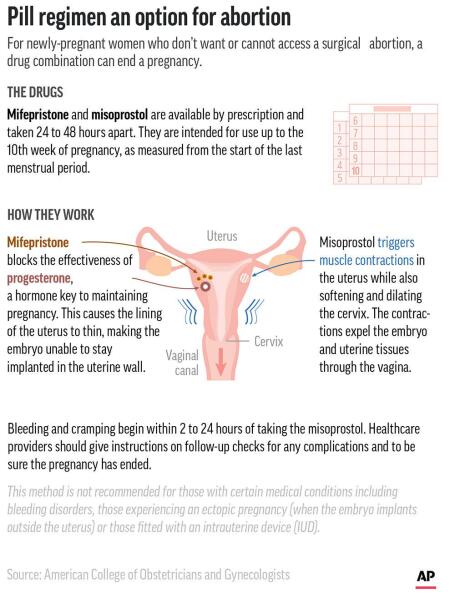To determine if a medical abortion has been successful, watch for the cessation of pregnancy symptoms and the confirmation through a follow-up visit with a healthcare provider. Ultrasound or blood tests typically provide evidence of a completed abortion. Medical Abortion Worked.
A medical abortion, a procedure to terminate an early pregnancy using medication, is a choice many women may consider. Knowing whether the process has worked is crucial for physical health and emotional closure. The process typically involves a combination of medications, such as mifepristone and misoprostol, that induce cramping and bleeding similar to a heavy menstrual period.
The key indicators of a successful medical abortion include the alleviation of common pregnancy symptoms, such as nausea and breast tenderness, and the onset of bleeding and cramping. It is essential for anyone who has undergone a medical abortion to attend a follow-up appointment, usually two weeks after the medication is taken, to ensure the procedure is complete. This visit may include an ultrasound or a blood test to confirm that the uterus is clear and no pregnancy tissues remain.
Introduction To Medical Abortion
An Introduction to Medical Abortion unveils the process behind using medication to end an early pregnancy. Women across the globe access this non-invasive option for various personal reasons. Understanding how medical abortions work helps in making informed decisions. Grasp the essence of this procedure and learn what steps to follow post-abortion to ensure health and well-being.
The Basics Of The Abortion Pill
Medical abortion involves two types of pills: Mifepristone and Misoprostol. The first pill, Mifepristone, is taken orally. It blocks the hormone progesterone, causing the lining of the uterus to break down. Within 48 hours, the second pill, Misoprostol ensures the uterus expels the pregnancy. Knowing the correct usage of these medications is crucial for the procedure’s success. Several factors influence their effectiveness, including the duration of the pregnancy and adherence to the prescribed protocol.
- Mifepristone: First pill, stops progesterone.
- Misoprostol: Second pill, causes contractions.
Importance Of Post-procedure Follow-up
Follow-up appointments play a key role in determining the success of a medical abortion. These check-ups ensure that the abortion was complete and monitor recovery. Health professionals might recommend ultrasound or a blood test. They could also provide guidance on contraception and answer any concerns.
| Follow-Up Component | Reason for Importance |
|---|---|
| Verification of Abortion Completion | To confirm the pregnancy has been fully terminated. |
| Recovery Monitoring | To check for any complications or infections. |
| Contraceptive Guidance | To discuss future pregnancy prevention options. |
A successful medical abortion ends the pregnancy without surgical intervention. Signs of successful abortion include the cessation of pregnancy symptoms and the completion of tissue passage. These indicators, along with professional medical advice, validate the effectiveness of the procedure.

Credit: www.healthdirect.gov.au
Recognizing Successful Abortion
Knowing whether a medical abortion has worked is crucial for peace of mind and physical health. A successful medical abortion leads to certain changes in the body. Women experience various symptoms and changes that indicate the process’s completion. Awareness of these signs ensures that any complications are addressed promptly.
Expected Physical Symptoms
Typical symptoms after a medical abortion might include:
- Bleeding: Light to heavy bleeding can occur for a few weeks.
- Cramping: Abdominal pains similar to menstrual cramps are common.
- Passing Tissue: Small clots or tissue may pass naturally.
Note the duration and intensity of these symptoms. Persistent, heavy bleeding or severe pain warrants a doctor’s visit.
Normal Changes Post-abortion
After an abortion, the body starts to return to its pre-pregnancy state. This includes:
- Hormone levels: Hormonal balance is restored.
- Menstruation: Regular periods should resume within 4-8 weeks.
Emotional changes are also normal, with feelings ranging from relief to sadness. Support networks or counseling may help manage these emotions.
Bleeding Patterns
Knowing how your body responds to a medical abortion is crucial. Bleeding is a common sign that the process is underway. Understanding what to expect can provide reassurance during this time.
Typical Duration And Amount
After a medical abortion, bleeding varies between individuals. It can be light, moderate, or heavy and resemble a menstrual period.
- Bleeding usually starts within a few hours.
- It can last for a couple of days to a few weeks.
- The heaviest bleeding typically occurs in the first five hours.
When To Be Concerned
While bleeding is standard, some signs may warrant attention:
| Time Frame | Bleeding Pattern | Action |
|---|---|---|
| 24 hours post-pill | No bleeding at all | Contact a healthcare provider |
| 2 hours with heavy flow | Soaking more than 2 large pads/hour | Seek immediate medical care |
| Several weeks | Light bleeding or spotting | Normal part of recovery |
Bad-smelling discharge or severe discomfort may indicate an infection. In such cases, contact your doctor promptly.
Pain And Discomfort
Understanding the pain and discomfort during a medical abortion is key to knowing if the process is progressing as it should be. Typical symptoms can include cramps and pain, which are signs that the body is responding to the medication. Still, recognizing the difference between normal discomfort and potential complications is crucial for your health and peace of mind.
Managing Cramps And Pain
Many women experience cramps and pain similar to menstrual cramps during a medical abortion. This is usually a sign that the abortion pills are working. However, managing these symptoms effectively can help you remain comfortable.
- Use pain relievers: Over-the-counter pain medication like ibuprofen can ease cramps.
- Apply heat: A warm heating pad or a hot water bottle can provide relief.
- Stay hydrated: Drinking plenty of fluids helps reduce discomfort.
- Rest: Allow your body time to recover; take it easy.
Red Flags In Discomfort Levels
While discomfort and cramps are normal, certain signs warrant immediate attention. Be aware of these red flags in discomfort levels:
| Sign | Action Required |
|---|---|
| Severe Pain | Contact a health provider right away. |
| Heavy Bleeding | Call for medical help if soaking through pads each hour. |
| Persistent Symptoms | If pain persists after 24 hours, seek medical advice. |
| Fever | A high fever could indicate an infection, requiring urgent care. |
Attentiveness to these warning signs and timely action can help prevent serious complications.
Emotional Responses
Going through medical abortion brings not only physical changes but also emotional ones. After the procedure, it’s common for emotions to bubble up. Understanding these reactions is crucial. This section delves into the emotional aftermath and where to find support.
Common Emotional Reactions
After a medical abortion, a range of feelings may surface. Many people experience a mix of the following:
- Relief: because the process is over
- Sadness: over the loss, regardless of the choice
- Guilt: which can come even if you know it was the right decision
- Anxiety: about the future and health
- Empty feelings: as hormones adjust post-abortion
These responses are normal. Give yourself time to heal and process them.
Seeking Support And Help
If emotions feel overwhelming, remember support is available. Consider these options:
- Talk therapy: Professionals can guide you through emotions.
- Support groups: Connect with others who understand.
- Hotlines: Anonymous, immediate support for urgent needs.
- Family and friends: Loved ones can provide comfort and a listening ear.
Finding the right kind of support is a positive step toward emotional recovery.
Confirmation Tests
Understanding whether a medical abortion has been successful is crucial for one’s health.
After a medical abortion, certain tests help confirm the outcome.
These Confirmation Tests include ultrasound examination and HCG level monitoring.
Ultrasound Examination
Doctors use ultrasound to look inside the body.
It shows if the uterus is empty after an abortion.
This test happens a few weeks after medication.
Ultrasound gives clear images for doctors to check everything.
Hcg Level Monitoring
HCG is a hormone in the body when someone is pregnant.
After an abortion, HCG levels start to drop.
Doctors test HCG to make sure these levels decrease correctly.
They use blood tests for this purpose.
Several tests might be needed to confirm the abortion’s success.
| Test | Purpose | Process |
|---|---|---|
| Ultrasound | Visual confirmation | Non-invasive scan |
| HCG Blood Test | Hormone level check | Simple blood draw |
Note: Only a doctor can perform these tests safely.
Please see a doctor for these tests after an abortion.
Warning Signs Of Complications
After a medical abortion, it is crucial to monitor your health closely. Be aware of your body’s signals. Some signs could indicate potential complications, which require immediate medical attention. Noticing them early ensures a safer recovery process.
Signs Of Incomplete Abortion
It is essential to recognize the signs that an abortion may not have been fully successful. Symptoms include:
- Continuous heavy bleeding that soaks through more than two pads per hour for over two hours.
- Severe abdominal pain that doesn’t get better with pain relief medications.
- Persistent and strong-smelling vaginal discharge.
- No decrease in pregnancy symptoms or if they return after stopping.
These signs warrant a prompt check-up with your healthcare provider.
Symptoms Of Infection
After an abortion, infection can be a serious concern. Important symptoms include:
- Fever of 100.4°F (38°C) or higher that lasts more than 4 hours.
- Chills indicating a high fever, not just feeling cold.
- Abdominal tenderness, making it uncomfortable to touch or press the belly area.
- Smelly vaginal discharge, which may accompany persistent bleeding.
- Feeling sick and run-down can also suggest an infection is present.
Any prolonged or severe symptoms after a medical abortion need immediate medical intervention.

Credit: www.plannedparenthoodaction.org
Post-abortion Care Tips
After a medical abortion, proper care is crucial for recovery. This guide offers tips to help the body heal and manage emotions. Here, we’ll discuss how to support physical and emotional health post-abortion.
Physical Recovery Tips
Caring for your body post-abortion is key. Here are steps to promote healing:
- Rest: Give your body time to recover. Avoid heavy lifting and strenuous exercise for a few days.
- Hydration: Drink plenty of fluids to stay hydrated. Water and herbal teas are good options.
- Nutrition: Eat balanced meals with iron-rich foods to replenish your body and aid in healing.
- Pain Management: Use doctor-approved painkillers as needed to ease discomfort.
- Follow-up: Schedule a follow-up appointment to ensure your body is healing as expected.
- Understand Warning Signs: Know signs of complications, like severe pain or heavy bleeding, and contact a health professional if they occur.
Emotional Health Resources
Emotional recovery is as important as physical. Explore these resources:
- Counseling: Seek professional help to process your feelings.
- Support Groups: Connect with others who have had similar experiences.
- Self-Care Techniques: Practice relaxation methods like meditation or deep-breathing exercises.
- Healthy Habits: Engage in activities that bring joy and reduce stress.
- Hotlines: Reach out to hotlines for anonymous support anytime you need it.
Follow-up Appointments
Understanding Follow-Up Appointments after a medical abortion is key. These check-ups ensure that the process completed safely and effectively. Women need clarity on what occurs next. Follow-ups confirm health and well-being post-abortion.
The Importance Of Post-abortion Check-ups
Post-abortion check-ups hold great significance. They confirm that the abortion was successful. They also detect any complications early. A complete check-up avoids future health issues related to the procedure.
- Verifies completion: A doctor checks if the uterus is empty.
- Health monitoring: Physical well-being is assessed.
- Emotional support: Mental health is as important as physical.
What To Expect During Follow-up
During a follow-up appointment, you will likely go through several steps:
- Medical history review: Doctors discuss your recent health.
- Physical examination: This may include an ultrasound.
- Discussion of symptoms: Be open about any discomfort.
- Birth control planning: Doctors may counsel on future contraceptive methods.
It’s normal to experience a range of emotions. Doctors can provide or recommend support services.
| Phase | Action | Outcome |
|---|---|---|
| Initial Check | Assessment of the uterus | Ensure no remaining tissue |
| Health Check | General physical health evaluation | Rule out complications |
| Emotional Support | Assess mental state | Offer resources if needed |

Credit: www.theguardian.com
When To Seek Medical Attention
Understanding when to seek medical attention after a medical abortion is crucial. Your health and safety are paramount. Observe your body’s reactions closely. Sometimes, signs that appear normal may not be. It’s important to differentiate. This ensures prompt care if needed. Here we’ll discuss urgent symptoms you must not ignore. Learning how to navigate the healthcare system post-abortion is also essential for your wellbeing.
Urgent Symptoms To Watch For
Immediate action is necessary if you encounter any of these symptoms:
- Severe pain in the abdomen that doesn’t get better with painkillers.
- Excessive bleeding soaking two or more pads an hour for two hours.
- Fever above 38°C (100.4°F) or chills could indicate an infection.
- Foul-smelling discharge which could signal an infection.
- Persistent symptoms like nausea, vomiting, or diarrhea lasting more than 24 hours.
- Feeling faint, weakness, or dizziness, suggesting heavy blood loss.
These symptoms might signal complications. They require prompt medical evaluation.
Navigating The Healthcare System Post-abortion
After an abortion, navigating the healthcare system can be daunting. Stay informed about your post-abortion care. Here’s how:
- Keep your follow-up appointments without fail. They are crucial for monitoring your recovery.
- Make a list of essential contacts like your clinic, doctor, or emergency services.
- Understand your health coverage and what services it includes for post-abortion care.
- Carry your medical records when visiting the hospital or clinic for seamless care.
- If uncertain or anxious, seek support groups or counseling services.
Ensure you receive adequate care and support post-abortion. Address any health concerns immediately.
Frequently Asked Questions For How To Tell If Medical Abortion Worked
What Are Signs Of Successful Medical Abortion?
A successful medical abortion typically results in symptoms such as heavy bleeding with clots and the easing of pregnancy symptoms like nausea.
Can You Bleed And Still Be Pregnant After An Abortion?
Bleeding after an abortion does not always indicate pregnancy termination; continuing signs of pregnancy may require a follow-up with your healthcare provider.
How Long Does Bleeding Last Post-abortion?
Bleeding following a medical abortion can vary but usually lasts one to two weeks. Contact your doctor if bleeding is extremely heavy or prolonged.
What Complications Suggest An Incomplete Abortion?
Complications such as severe pain, fever, or prolonged heavy bleeding may indicate an incomplete abortion and necessitate medical attention.
Are Follow-up Appointments Necessary After An Abortion?
Yes, follow-up appointments are crucial to ensure the abortion was complete and to monitor your recovery process.
What To Expect During A Medical Abortion Follow-up Exam?
During the follow-up, a healthcare provider will check for signs of complications, ensure complete termination, and discuss contraception options.
How To Manage Pain Post-medical Abortion?
Manage pain with doctor-recommended over-the-counter pain relievers, heat pads, and rest. Consult your doctor if pain is severe.
Can I Use A Home Pregnancy Test After An Abortion?
Home pregnancy tests may still show a positive result for several weeks after an abortion; follow-up with your doctor is recommended for accurate results.
What Is The Time Frame To Resume Normal Activities?
Most individuals can resume normal activities within a few days, but it’s important to adhere to your healthcare provider’s specific advice on recovery.
When To Seek Medical Help Following An Abortion?
Seek medical help if you experience severe pain, heavy bleeding, fever, or any other symptoms that concern you after an abortion.
Conclusion
Determining the success of a medical abortion is crucial for your health and peace of mind. Watch for clear signs, like the cessation of pregnancy symptoms and a follow-up exam confirmation. Always seek professional advice for reassurance. Remember, your well-being is paramount during this critical time.



